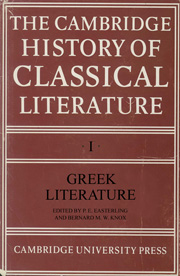Book contents
- Frontmatter
- 1 Books and readers in the Greek world
- 2 Homer
- 3 Hesiod
- 4 The epic tradition after Homer and Hesiod
- 5 Elegy and iambus
- 6 Archaic choral lyric
- 7 Monody
- 8 Choral lyric in the fifth century
- 9 Early Greek philosophy
- 10 Tragedy
- 11 The satyr play
- 12 Comedy
- 13 Historiography
- 14 Sophists and physicians of the Greek enlightenment
- 15 Plato and the Socratic work of Xenophon
- 16 Oratory
- 17 Aristotle
- 18 Hellenistic poetry
- 19 Post-Aristotelian philosophy
- 20 The literature of the Empire
- 21 Epilogue
- Appendix of authors and works
- Metrical appendix
- Works Cited in the Text
- References
3 - Hesiod
Published online by Cambridge University Press: 28 March 2008
- Frontmatter
- 1 Books and readers in the Greek world
- 2 Homer
- 3 Hesiod
- 4 The epic tradition after Homer and Hesiod
- 5 Elegy and iambus
- 6 Archaic choral lyric
- 7 Monody
- 8 Choral lyric in the fifth century
- 9 Early Greek philosophy
- 10 Tragedy
- 11 The satyr play
- 12 Comedy
- 13 Historiography
- 14 Sophists and physicians of the Greek enlightenment
- 15 Plato and the Socratic work of Xenophon
- 16 Oratory
- 17 Aristotle
- 18 Hellenistic poetry
- 19 Post-Aristotelian philosophy
- 20 The literature of the Empire
- 21 Epilogue
- Appendix of authors and works
- Metrical appendix
- Works Cited in the Text
- References
Summary
‘Who could speak highly enough of training in the art of writing?’ asks the historian Diodorus (12.13.2). ‘By this means alone the dead speak to the living, and through the written word those who are widely separated in space communicate with those remote from them as if they were neighbours.’ The quarter-millennium from c. 730 to c. 480 in Greece was a period in which literacy came to have far-reaching effects on literature, making possible an infinitely complex network of relationships between authors remote from one another in time or space or both, and allowing the development of a single unified literary culture, to which local differences only added richness. For it is no coincidence that as literacy spread there came a growing consciousness of national identity, the universal Greekness of all who spoke and wrote the common tongue. This capital event, the re-invention of writing, was itself, moreover, only one element among many in the great renaissance of Greece which came from the rediscovery of the wider world after centuries of isolation — centuries in which, following the collapse of the literate Mycenaean culture between 1200 and 1100, all the fine arts and delicate skills of the Bronze Age had been forgotten and all that remained was the memory of great deeds and great heroes, enshrined in the traditional forms of oral poetry and chanted to precarious settlements of refugees on the coastal fringe of Asia Minor.
It makes sense to begin a discussion of the period of Greek literacy with Hesiod, not because there is any certainty that he was a literate poet — in fact there is much to be said for the view that he worked in a tradition of formular oral poetry which was fairly closely akin to Homer's — but because he was doing something new and individual which pointed the way that subsequent Greek poetry was to take.
- Type
- Chapter
- Information
- The Cambridge History of Classical Literature , pp. 92 - 105Publisher: Cambridge University PressPrint publication year: 1985

